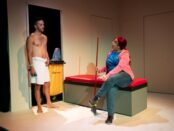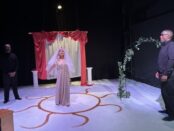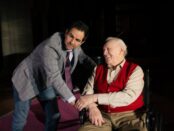Articles by Scotty Bennett
Bathhouse.pptx
Theatrical productions can sometimes be exhilarating, moving, provocative, informative, perplexing, confusing, dull, or bad. "Bathhouse.pptx," written by Jesús I. Valles and directed by Chay Yew, is in the realm of perplexing and confusing. In the words of Valles, “This play is a mess.” and “This play is a group project for perverts.” Even with Yew’s adept direction, the show is, in essence, episodic and, as such, confusing and perplexing. [more]
Pharaoh
This show, as conceived by Shulman, creates a unique theatrical experience combining narrative text with Kathakali, a form of traditional Indian dance exquisitely performed by Kalamandalam John. Shulman gives voice to all the characters, principally the Pharaoh. At the same time, John acts out the 54 different characters in an elaborate costume, colorful make-up (costumes and make-up by Dr. Kalatharangini Mary John), intricate gestures, expressive facial movements, and traditional dance moves of Kathakali. [more]
Medea (Fusion Theatre)
This production could be more balanced in the performances, with some characters being solidly played and others being line-readings lacking body movements that add to the dialogue. There are also changes to how the story is told. A number of passages have been removed that are important in establishing Medea's state of mind and exploring her internal struggle over how she will punish Jason for his betrayal. In addition to the revisions to some of Medea’s dialogue, the changes in the responses from the three women of the chorus are impactful. The chorus' purpose is to fill in gaps in the story and to clarify the thought processes being exposed by various characters. While the overall thrust of the story has not been altered, some of the nuances of the characters' behaviors have been lost. [more]
Tuesdays with Morrie
Seadog Theater’s current revival of "Tuesdays with Morrie," with exceptional direction by Erwin Maas, is a beautifully orchestrated presentation starring Len Cariou as Professor Morrie Schwartz and Christopher J. Domig as author Mitch Albom . The chemistry between these actors is riveting, grabbing one’s attention solidly but gently from the opening moments to the tearful end. They are a perfect match to tell this story. Don’t hesitate, for a moment, to see this production. You will laugh, cry, and come away feeling that you just experienced something extraordinary. [more]
Maiden Voyage
Under Alex Keegan's skillful direction, the characters are allowed to develop their understanding of who they are and how they fit in an organization traditionally run by men. The captain is the one most aware of the paternalistic nature of military organizations, so she is determined that this patrol will be completed without issues. Crawley shows us the struggle the captain has in finding a balance between her personal actions from a female perspective and those that are conditioned from a male perspective. This male-oriented conditioning is less of an issue with other team members, although there are suggestions that it still influences their official duties. [more]
The Order of the Golden Scribe: Initiation Tea
"The Order of the Golden Scribe: Initiation Tea" is an immersive and interactive theater experience co-created by Shuai Chen and Arlo Howard, who also directed. It combines a story about a secret society of historian scribes with a series of creatively challenging cryptographic puzzles. It is all wrapped up in an elaborate initiation "tea" for new members of the Order. The initiation ceremony requires the initiates to prove themselves worthy of joining the Order by solving the puzzles. Each successful solution is rewarded with first tea, then finger sandwiches, followed by scones with jam and butter, and finally, a dessert. The puzzles are cleverly conceived and presented. The audience is divided into teams of four or five seated at café style tables. [more]
Until Dark
The balance is off between the two storylines. If the most crucial dramatic element of the story is the legal issue surrounding consent, the dynamics of the sisters’ current and historical relationship do not satisfactorily clarify that issue. If the story’s primary focus is the nature of the relationship between the sisters, the legal issue overshadows the intricacies and nuances of their relationship. The two main storylines of the play contain strong dramatic elements that would stand well by themselves—the final two scenes attempt to bring closure to the dramatic arcs but miss the mark. They seem to operate as endings to the two stories. While the show is a solid attempt at dramatizing the issue of consent when it comes to sexual relationships, it doesn’t quite squarely hit the mark. [more]
you don’t have to do anything
"you don’t have to do anything" written by Ryan Drake is a story that explores a gay man’s coming of age from the time he was in seventh grade until graduating from college. It is set in the period when cell phone and computer messaging were becoming more prevalent. The central theme of the production is the psycho-social impact of homosexuality from a young man’s adolescence into his early twenties. Ryan Dobrin's direction is effective, given the nuanced presentation of the central theme with dialogue that suggests misinterpretation of events and misunderstandings of emotional content. [more]
The Boy Who Listened to Paintings
Alyson Reim Friedman, Thom Brown III, Niko Zylik as young Nicky, Donovan Counts, Alisa Ermolaev and [more]
The Fantastical Fellowship: Final Quest for the Crisis Crystal XXVII
The hardworking cast takes us along on the quest by playing multiple characters and using a wide array of props scattered on tables at the edge of the performance space. The transformations are not always smooth, which leads to some humorous moments. The jokes are corny, some of which are groan-worthy. The show lacks coherence and has an amateurish feel, never taking itself seriously as drama. [more]
Crime and Punishment
Tyson’s portrayal of Raskolnikov is riveting as he moves through the elements leading inexorably to his mental collapse. The exchanges with Porfiry are woven together with encounters with the people in his life that had an impact on his present mental state. Each of these ancillary scenes are used to fill gaps in the storyline needed to clarify Raskolnikov’s mental state and the exchanges that take place with the inspector. Lenartz gives a first-rate performance not only of Porfiry, but of all the characters he inhabits. He transforms into each of these characters with small changes in costume and with his movement and speech. He makes each of the ancillary characters distinct. This same skill is evident in Stone’s portrayal of all the women in the story, with small changes in costume and physicality she becomes a new character. The only quibble I have is with her portrayal of the character Sonia. The age of the character is important in the story, and although Stone does not fit the part, it does not diminish the impact of the performance. [more]
Brighter than the Sun
Hendley is solid in his performance as the narrator of his and his grandmother’s story. His presentation commands attention without demand, smoothly and effortlessly focusing on the words being spoken. He has created a show with a strong storyline but needs a rework of the structure. Although his narrational guidance is well-written and beautifully presented, it adds too much exposition when perhaps the information could be dramatized. [more]
Ernie’s Secret Life
The show is well presented but lacks a clear narrative, leaving viewers with more questions than answers. Is it about a man's journey to self-discovery or an exploration into a confusing haze of fantasy and hallucination brought on by a mental breakdown? The added storylines used to illustrate narrative points do not clarify the overall thematic structure of the production but add layers to the mystery of Ernie’s mental state. If you like theater, even with the limitations in exposition, it is worth the effort to experience a production outside of what people typically consider dramatic staging. [more]
Becoming Chavela
Ranchera is a style of traditional Mexican folk music with origins in the ranchos of rural Mexico. The songs are about love, patriotism, or nature and are usually sung by men. The vocals have a rough, raw quality in contrast to the more refined vocalizations of the urban singers. In Mexico City, Chavela defied the norms and sang rancheras with her style and interpretations while staying true to the rawness of delivery and the ideas expressed by the lyrics. Trudeau transforms herself into Chavela with an on-stage costume change and then provides solid interpretations of some of Vargas’ classic rancheras as she takes the audience on an exploration of Vargas' life in Mexico City, a brief time in Cuba and to the mid-1970’s when she stopped performing as a result of all the tequila she had consumed over the years. Although Trudeau's voice is more refined, she still delivers the songs with all the passion and fire needed in some and the introspection and sadness in others. Her embodiment of Vargas is complete. [more]
The Inheritance of a Long-Term Fault
"The Inheritance of a Long-Term Fault," written by Mêlisa Annis and directed by Vanessa Morosco, is an extraordinary play that explores how the societal structures across many cultures have shaped cultural interactions and defined what is viewed as societal norms to the present day. It is a provocative, thought-provoking look at how colonial patriarchal behaviors and attitudes about women's roles persist into the present day. It is a show worth seeing and, more importantly, exploring the ideas engendered by it. [more]
Killin’ Republicans
"Killin’ Republicans," concept and libretto by Dick D. Zigun and music by Arturo Rodriquez, directed by vagabond, is billed as a rock opera about violence towards certain Republican Party leaders since the mid-nineteenth century. It deals with a series of assassinations and attempted assassinations of Republican leaders from the 1850s to President Reagan in 1981. It is supposed to be a discussion about the reasons for the attacks and not a call for violence against Republicans. The entire show is sung or performed in spoken form in various styles as more of a concept concert than an opera. The libretto covers a wide range of events attempting to give context to the multiple incidents but fails to clarify the point of the show. It is a mistake in its present form. [more]
United Nations: The Other West
"United Nations: The Other West," written and directed by Bossert, is an outstanding example of the hybrid theatrical system he has created. This production is an extension of his 2022 "United Nations: The Border and The Coast" with connections to stories streamed on Thirdwing’s internet platform. This form of theatrical production aims to bridge theater and film in a way that tells important stories that pierce the limitations of traditional theater and allow for a more expansive exploration of characters and themes. Bossert’s direction of an exceptional ensemble delivers an entertaining evening of theatre with humor and important ideas. This is not derivative of any other production; it stands alone as a play worth seeing. [more]
Ode to the Wasp Woman
"Ode to the Wasp Woman," written and directed by Rider McDowell, is a play done in the style of film noir and true crime films of the 1950’s. The show focuses on the events leading up to the death of four actors from the B-movies of the 1950’s: Carl "Alfalfa" Switzer, Susan Cabot, George Reeves, and Barbara Payton. It is essentially four acts in style and dialogue that are uneven in terms of theatrical structure, but given the nature of B-movies, they fit within the two dominant styles of noir and true crime. Even though McDowell captures the feel of a B-movie, there are issues within the production that don't fit. It also takes some knowledge of B-movies in terms of genres and styles. If you do not know what the B-movies were like, you may not like the show, and even if you are a B-movie fan, you may not pick up on the resemblance to those movies. [more]
Hell Dialogues
The production was conceived in the wake of the Russian invasion of Ukraine as a group of actors was performing "No Exit (Huis clos)." They decided to adapt the ideas of Sartre’s work into one that explores human nature amidst turmoil by looking at war, democracy, society, and social interaction using themes from Plato. The play uses physical and verbal improvisation, including, at times, engaging with the audience without breaking character. It is a complex undertaking in which thematic clarity is missing, especially when trying to incorporate the Platonic ideas of social morality and justice. It is for an audience that enjoys the challenge of theatrical experimentation and intellectual stimulation requiring focus and concentration. [more]
#UglyCry
What is remarkable about Mack's performance is that she is reliving the grieving process with every performance. It is not a fictional story with an actor taking on a role; this is a powerful emotional connection within her life. Using regular references to the audience's use of cell phones, she guides us to her discovery of what it means to talk with the dead. This show encourages using cell phones to take pictures, make recordings, and, most importantly, scan QR codes posted on the theater walls or that may appear on an upstage screen during the show. They contain information that will enhance understanding of the show or will guide to articles that will expand on some of the ideas being presented. These QR codes are designed to be a visceral engagement with grief as Mack experienced the loss of her ex-boyfriend and long-time friend Eric Anthamatten in 2011. [more]
The Mysterious Case of Kitsy Rainey
Mikel Murfi skillfully brings to life a handful of colorful characters in a rural town where Farnon is the cobbler. The transitions from one character to the next are done with shifts in posture and tone of voice that imbues each transition with the physical and verbal nuances that define the character. It is an interesting tale, rough in places and a bit too long in exposition, but well told by a seasoned actor whose performance is worth spending time on. [more]
David Dean Bottrell: The Death of Me Yet
All eight stories are engagingly woven into a pattern that illustrates the things that help us understand what it is to encounter a fear of death or even a fear of living. David Dean Bottrell is a storyteller of great skill. He effortlessly gains the attention of his listeners and gently, lovingly carries them through 80 minutes of engaging and thoughtful moments in his adventurous life. [more]
Chasing Happy
"Chasing Happy," written by Michel Wallerstein and directed by Alexa Kelly, is a five-character comedy about a gay love triangle. It unravels like a pilot for a television sitcom that borrows characterizations from other sitcoms. Despite the efforts of a skillful, hard-working ensemble, the show never rises to the challenge of solid character development within a believable story. It was not a well-spent two hours for this reviewer. [more]
Down the Road
Lee Blessing's "Down The Road" is a tale that explores what can happen when "normal" people are confronted with the psychopathy of evil in the form of a charming, ego-centric serial killer. Skillfully directed by Chris Ryan, the story introduces a husband and wife writing team that their editor has assigned to do a book about a notorious killer responsible for the deaths of at least 19 women. It is not a play about the motivations behind a killer's acts. It is about what happens to rational, focused people when dealing with psychopathic evil. It is that examination that this production gets right from the slow unraveling of the couple's relationship with each other to the emotional and intellectual seduction of the killer. It is an engaging, chilling look into a heart of darkness. [more]
The Lights Are On
"The Lights Are On," written by Owen Panettieri and directed by Sarah Norris, is a psychodrama that plays with two ideas: are we really who we think we are, and what are the reasons we do what we do? It explores the light and dark of personal psychology, our perceptions of those around us, the events that shaped those people, and ultimately, ourselves. Panettieri’s script and Norris' actualization result in a solid theater piece. It is a well-conceived and solidly acted play whose every minute is worth experiencing. [more]
The Picher Project
"The Picher Project" is a bluegrass and folk-infused musical conceived and directed by Quentin Madia, with music, book, and lyrics by Madia and Lauren Pelaia. This show is based on real-life events that are not only a part of Oklahoma's history but also of the social and industrial history of the United States. Through words and songs, the story is told of how this gentle, quiet, rural area became the center of lead and zinc mining in North America, only to end up dead as the number one most polluted place in the United States. [more]
The Making of a Great Moment
"The Making of a Great Moment" by Peter Sinn Nachtrieb and directed by James Barry is a play about a pair of actors who are the principal players and only members of a bicycle theatrical touring company. It is a delightfully light-hearted story that takes us with them as they travel across New Hampshire with a show exploring the idea that "Great Moments" can happen unexpectedly. It is a show worth spending time with, although there are occasional bumps, flat tires, and rain storms in the journey. [more]
Twisted
It takes considerable skill for competent actors to play at being bad actors, and many of the cast members succeed. It is not a bad play, but the overarching problem with the show is that it is playing to a niche audience. If you do not know anything about the B-movies of the 50’s and 60’s, you will react as I did in thinking it is a terrible play. If you are familiar with the work of Roger Corman, William Castle, or any other B-film directors, or any of the films, such as "Galaxy of Terror," "The Little Shop of Horrors," "The Tingler," "The Curse of the Werewolf," or any of the dozen movies of that period, you may enjoy this production [more]
“Dear Mr. Bottrell, I Cannot Possibly Accept This”
David Dean Bottrell is both a craftsman and an artist, as evidenced in his delightful and exquisitely entertaining show "Dear Mr. Bottrell, I Cannot Possibly Accept This." From his Prologue about the shape and size of a certain object to his adventures in New York and Los Angeles, and with his family in Kentucky, he takes us on a journey through the twist and turns of his life, and what a life it has been. [more]
The Jester’s Wife
"The Jester’s Wife," written and directed by T.J. Elliott, is a fanciful attempt at reconstructing the source of the myth of Dymphna, a legendary medieval Irish saint who is considered the patron saint of mental illness. In telling the tale's origins, two characters create the framework what is to become the myth, and the third offers editorial commentary on their effort. While it is an intriguing idea to show how legendary myths were often created, this show does not measure up. The primary issue is the lack of a compelling interaction between the Jester and his Wife, leading to the creation of the story of Saint Dymphna. [more]
9 Kinds of Silence
This play demands attention to the smallest details and a thoughtful encounter with what truth is being hidden and revealed in both the spoken text and the silent actions. It leaves one with a need to make sense of the experience and the feelings that it engenders. It is drama to be experienced and savored. See the show if you like intense, thoughtful, well-acted drama. [more]
alt-Hamlet
"alt-Hamlet," written and directed by Suzanne Willett, loosely uses "Hamlet' 's plotting and character types in a carnivalesque/grotesque black comedy. Inspired by the US Supreme Court's 2022 decision on abortion rights, Willett penned an indictment of the court’s imposition of legally sanctioned restrictions on women’s control over their bodies. She uses Hamlet as the vehicle for the story since it was a play centered on the Elizabethan view of inheritance as a right. Her play centers on a woman’s right to control her body. She also uses pregnancy and "morning-after" and "abortion" pills as elements in the story. While the topics dealt with are important, this production does not effectively deliver on those topics, not for want of trying, but because of the venue and some directorial choices. It reads better than it plays. [more]

































